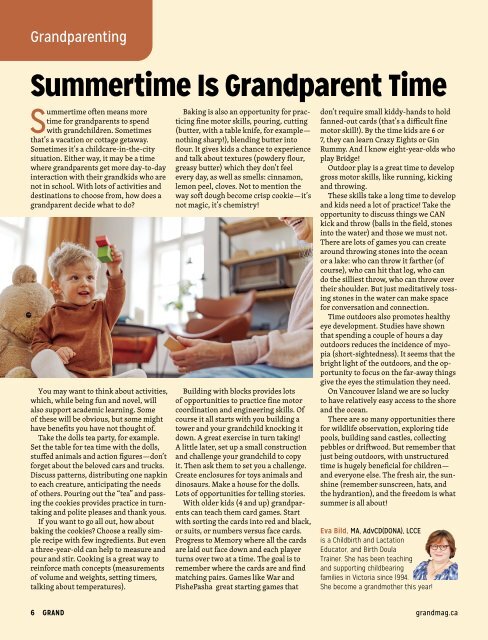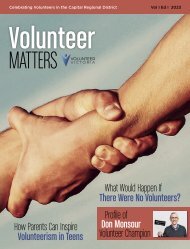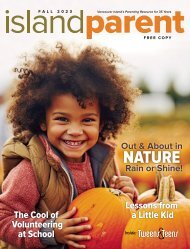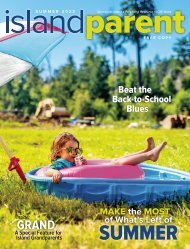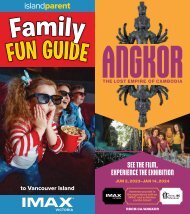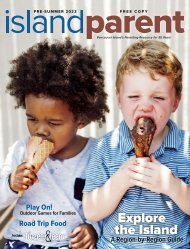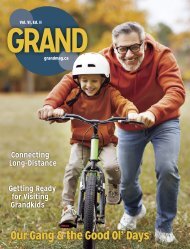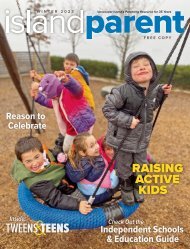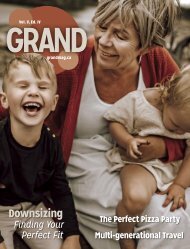GRAND Vol VI, Ed III
GRAND honours and supports grandparents by providing information on resources and businesses for families and a forum for the exchange of ideas and opinions: Relearning History: A Tour to Kiixin • Summertime Is Grandparent Time • Helping Kids Face Their Fears
GRAND honours and supports grandparents by providing information on resources and businesses for families and a forum for the exchange of ideas and opinions: Relearning History: A Tour to Kiixin • Summertime Is Grandparent Time • Helping Kids Face Their Fears
Create successful ePaper yourself
Turn your PDF publications into a flip-book with our unique Google optimized e-Paper software.
Grandparenting<br />
Summertime Is Grandparent Time<br />
Summertime often means more<br />
time for grandparents to spend<br />
with grandchildren. Sometimes<br />
that’s a vacation or cottage getaway.<br />
Sometimes it’s a childcare-in-the-city<br />
situation. Either way, it may be a time<br />
where grandparents get more day-to-day<br />
interaction with their grandkids who are<br />
not in school. With lots of activities and<br />
destinations to choose from, how does a<br />
grandparent decide what to do?<br />
You may want to think about activities,<br />
which, while being fun and novel, will<br />
also support academic learning. Some<br />
of these will be obvious, but some might<br />
have benefits you have not thought of.<br />
Take the dolls tea party, for example.<br />
Set the table for tea time with the dolls,<br />
stuffed animals and action figures—don’t<br />
forget about the beloved cars and trucks.<br />
Discuss patterns, distributing one napkin<br />
to each creature, anticipating the needs<br />
of others. Pouring out the “tea” and passing<br />
the cookies provides practice in turntaking<br />
and polite pleases and thank yous.<br />
If you want to go all out, how about<br />
baking the cookies? Choose a really simple<br />
recipe with few ingredients. But even<br />
a three-year-old can help to measure and<br />
pour and stir. Cooking is a great way to<br />
reinforce math concepts (measurements<br />
of volume and weights, setting timers,<br />
talking about temperatures).<br />
Baking is also an opportunity for practicing<br />
fine motor skills, pouring, cutting<br />
(butter, with a table knife, for example—<br />
nothing sharp!), blending butter into<br />
flour. It gives kids a chance to experience<br />
and talk about textures (powdery flour,<br />
greasy butter) which they don’t feel<br />
every day, as well as smells: cinnamon,<br />
lemon peel, cloves. Not to mention the<br />
way soft dough become crisp cookie—it’s<br />
not magic, it’s chemistry!<br />
Building with blocks provides lots<br />
of opportunities to practice fine motor<br />
coordination and engineering skills. Of<br />
course it all starts with you building a<br />
tower and your grandchild knocking it<br />
down. A great exercise in turn taking!<br />
A little later, set up a small construction<br />
and challenge your grandchild to copy<br />
it. Then ask them to set you a challenge.<br />
Create enclosures for toys animals and<br />
dinosaurs. Make a house for the dolls.<br />
Lots of opportunities for telling stories.<br />
With older kids (4 and up) grandparents<br />
can teach them card games. Start<br />
with sorting the cards into red and black,<br />
or suits, or numbers versus face cards.<br />
Progress to Memory where all the cards<br />
are laid out face down and each player<br />
turns over two at a time. The goal is to<br />
remember where the cards are and find<br />
matching pairs. Games like War and<br />
PishePasha great starting games that<br />
don’t require small kiddy-hands to hold<br />
fanned-out cards (that’s a difficult fine<br />
motor skill!). By the time kids are 6 or<br />
7, they can learn Crazy Eights or Gin<br />
Rummy. And I know eight-year-olds who<br />
play Bridge!<br />
Outdoor play is a great time to develop<br />
gross motor skills, like running, kicking<br />
and throwing.<br />
These skills take a long time to develop<br />
and kids need a lot of practice! Take the<br />
opportunity to discuss things we CAN<br />
kick and throw (balls in the field, stones<br />
into the water) and those we must not.<br />
There are lots of games you can create<br />
around throwing stones into the ocean<br />
or a lake: who can throw it farther (of<br />
course), who can hit that log, who can<br />
do the silliest throw, who can throw over<br />
their shoulder. But just meditatively tossing<br />
stones in the water can make space<br />
for conversation and connection.<br />
Time outdoors also promotes healthy<br />
eye development. Studies have shown<br />
that spending a couple of hours a day<br />
outdoors reduces the incidence of myopia<br />
(short-sightedness). It seems that the<br />
bright light of the outdoors, and the opportunity<br />
to focus on the far-away things<br />
give the eyes the stimulation they need.<br />
On Vancouver Island we are so lucky<br />
to have relatively easy access to the shore<br />
and the ocean.<br />
There are so many opportunities there<br />
for wildlife observation, exploring tide<br />
pools, building sand castles, collecting<br />
pebbles or driftwood. But remember that<br />
just being outdoors, with unstructured<br />
time is hugely beneficial for children—<br />
and everyone else. The fresh air, the sunshine<br />
(remember sunscreen, hats, and<br />
the hydrantion), and the freedom is what<br />
summer is all about!<br />
Eva Bild, MA, AdvCD(DONA), LCCE<br />
is a Childbirth and Lactation<br />
<strong>Ed</strong>ucator, and Birth Doula<br />
Trainer. She has been teaching<br />
and supporting childbearing<br />
families in Victoria since 1994.<br />
She become a grandmother this year!<br />
6 <strong>GRAND</strong> grandmag.ca


